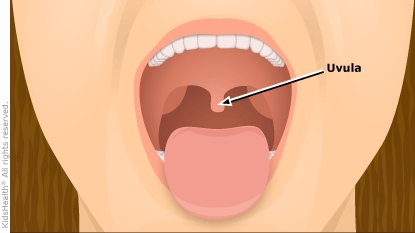Uvulitis (yoo-vyuh-LIE-tiss) is inflammation (redness and swelling) of the uvula. The uvula is the fleshy piece of tissue that hangs at the back of the throat. Kids with uvulitis usually have a sore throat. They may also have a fever, a cough, or a muffled voice, or they may say they feel like something is stuck in their throat.
Treatment for uvulitis depends on the cause, but most kids feel better within a few days. You can help your child feel better while healing.



Your child:

Your child has signs that the swelling may be blocking the airway, such as:

What causes uvulitis? Causes of uvulitis include:
Sometimes it's not clear what is causing uvulitis.
What is the treatment for uvulitis? Treatment for uvulitis depends on the cause and may include: